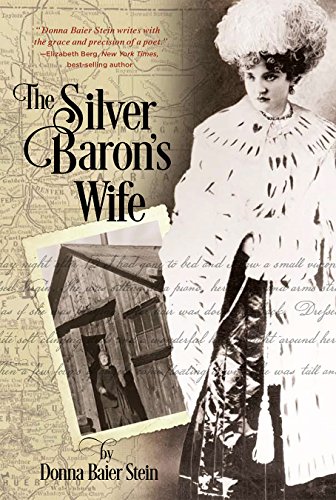Author: Donna Baier Stein
Publisher: Serving House Books
206 pages, $3.99 Kindle, $14.95 Paperback
Award-winning literary novelist Donna Baier Stein has just published a moving and powerful portrait of a controversial and memorable character well known here in Leadville, Colorado but little known at lesser altitudes, “Baby Doe” Tabor, the second wife of Horace Tabor, the 1880s Silver King who left his name on many local landmarks.
Baier Stein brings respect and restraint to this story of a scandalous love affair, keeping her story firmly rooted in a real woman’s battle to live her life on her own terms. In a time when women were expected to keep house and tolerate their men’s misdeeds, Elizabeth McCourt (Doe) Tabor boldly divorced a philandering, drug-addicted husband and sought her fortune in the booming mining town of Leadville. There she met and won the heart and hand of wealthy Horace Tabor, who divorced his wife Augusta for the beautiful young Lizzie. Baier Stein keeps her focus on Lizzie’s choices and actions, brilliantly illuminating her character as a woman of strength and courage. In Baier Stein’s telling, Lizzie truly loved her Horace, raising her two daughters with him after his financial ruin until his death. After his passing, while still a young woman left penniless with two daughters to support, she carried on as best she could to meet his last request, a plea to attempt to revive the Matchless Mine.
To Leadville locals, surrounded on every side by buildings still bearing the Tabor name and tourist picture postcards of the beautiful young Baby Doe, the dashing Horace Tabor and the stern-faced Augusta Tabor, the broad outlines of this story are familiar territory. What I found most moving and engaging in Baier Stein’s account was Lizzie’s inner experience of these familiar events. Her distress, for example, as an earnest and devout young Catholic, at contemplating divorce. Her visions and dreams, which she carefully recorded and pondered, looking for divine instruction and guidance. Her courage in seeking work in a man’s world, refusing the only readily available work for women in Leadville—prostitution. Far from the gold-digger of popular imagination, this Lizzie was a woman of constancy and spiritual depth, a devoted if disappointed mother and a true partner and lover to her Horace.
This is a work of fiction, and so Baier Stein’s Lizzie is a fictional Lizzie, but an authentic and believable one well-rooted in her time and circumstances. The author clearly researched her subject and the period deeply and rigorously, and drew much from Baby Doe’s own journals and letters, as well as the often lurid newspaper accounts of the time. As a reader who loves historical fiction, history and biography, I greatly admire the author’s skill in creating a vivid and memorable character while honoring the historical record and the oral traditions surrounding Baby Doe that still echo around town.
Recommendation: I wholeheartedly recommend this beautifully written book to anyone who enjoys historical fiction, especially set in the Wild West, biography or well-written biographical fiction. Whether you know the story of Baby Doe, or if you have never heard of her, you will enjoy this engaging and moving story of a brave and tragic woman who met life on her own terms no matter the cost.
